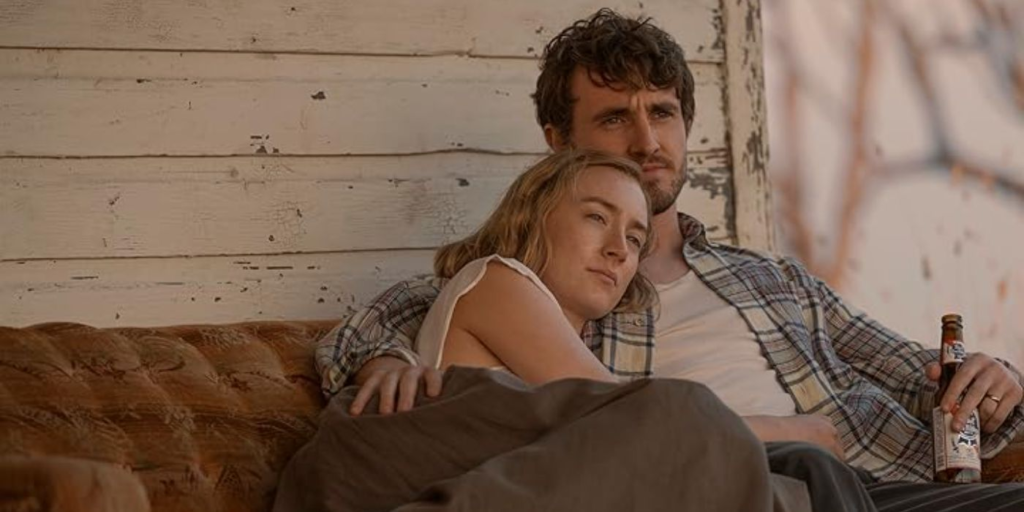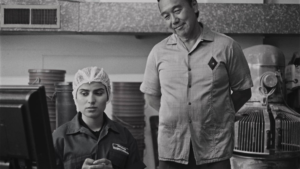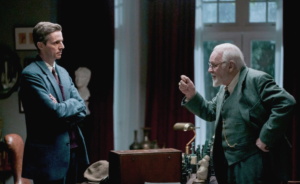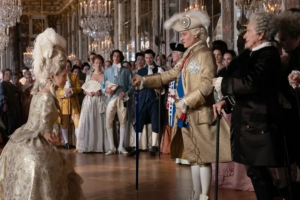Foe Reviewed by GREG KING
Director: Garth Davis
Stars: Paul Mescal, Saoirse Ronan, Aaron Pierre.

This slow burn and clunky psychological sci-fi drama is based on the 2018 novel written by Canadian author Iain Reid. Foe is set in a dystopian future world of 2065 when climate change has wreaked havoc on the environment and natural resources are drying up and becoming increasingly scarce and the Earth is becoming uninhabitable. Technology has developed to the extent that AI has created sentient human replicants to perform some of the more labour intensive jobs.
We meet Junior (Paul Mescal, from Aftersun, etc) and Henrietta (Saoirse Ronan), a married couple who live in the house that has been in Junior’s family for generations. They have been a couple since high school, but now the youthful enthusiasm and passion has long dissipated, and they are merely comfortable with each other. But they are then approached by Terrance (played by Aaron Pierre), a suave but enigmatic representative of aerospace corporation known as OuterMore, who informs them that Junior has been selected to spend time as part of a re-colonisation program on a space station orbiting the planet. And to ensure that Hen does not feel alone while he is gone, an AI created replicant of Junior will take his place. Junior is not exactly thrilled by these revelations. Terrance is charged with observing Junior to better understand his personality and nature and his intimate relationship with Hen, but his presence becomes more intrusive and disconcerting.
Foe has been adapted to the screen by director Garth Davis (best known for his film Lion) and Reid but it serves up a rather obtuse and muddled narrative. Davis is not interested in the usual special effects and tropes of the sci-fi genre but is more interested in exploring the dynamics between his three main characters and exploring bigger issues about the future of AI and how the world is changing, man’s impact on the environment and the fragility of human relationships. A haunting meditation on identity and artificial intelligence, the film is also an examination of a passionless marriage, but it almost demands to be viewed twice in order to ascertain what is happening throughout.
Davis and his production team have recreated the American Midwest in the Winton wetlands in the west of Melbourne, and the harsh, desolate landscapes become a metaphor for the state of the decayed marriage between Junior and Hen. The film is shot in a muted and largely brownish colour palette by cinematographer Matyas Erdely (Son Of Saul, etc) whose widescreen lensing gives the locations an ominous mood and he creates some striking visual imagery. As most of the drama occurs within the couple’s house, the film has a claustrophobic feel.
Foe is largely a three-handed drama and Davis has assembled a strong cast to flesh out the characters. While Junior is an underdeveloped character Mescal continues his impressive run of performances here, imbuing him with a volatile nature and cynicism as he confronts the emptiness of his own life. Ronan brings passion and a brittle quality to her performance as Hen who begins to yearn for a life beyond the farm. While Mescal and Ronan develop a strong chemistry, they fail to inject some much needed emotion and intensity into the material. However, Pierre’s performance is less nuanced and seems stiff and more measured and ultimately unsettling.
Foe runs for 108 minutes but somehow the ponderous nature, the languid pacing and lack of any real action gives the film a sense of faux gravitas that makes it seem to run for twice as long. Some of the themes will be familiar from other films that have explored the concept of AI and its impact on our lives, however, the film’s slow pace, unremittingly bleak outlook and lack of urgency may fail to engage with many in the audience.
★★



